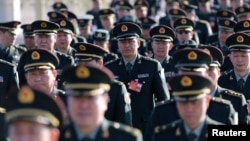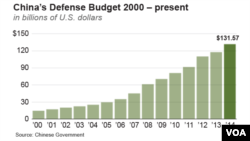Chinese state media defended the double-digit increase in defense spending announced this week by Beijing, saying concerns over China's growing military strength are unnecessary.
Premier Li Keqiang announced Wednesday that China will spend almost $132 billion on its military in 2014. That represents an increase of 12.2 percent - a rate of growth higher than in recent years.
The move drew statements of concern by some foreign analysts and calls for greater transparency from countries, including the United States and its ally Japan, which is involved in a territorial dispute with Beijing.
State Department spokeswoman Jen Psaki said the U.S. continues to urge China "to use its military capabilities in a manner conducive to the maintenance of peace and stability in the Asia-Pacific region." "We continue to carefully monitor China's military developments and to encourage China to exhibit greater transparency with respect to its capabilities and intentions," Psaki stated.
Japanese Chief Cabinet Secretary Yoshihide Suga said China's lack of transparency is becoming an issue, not only for Tokyo, but also for the rest of the international community. "We would like to urge China to elevate the level of transparency of its defense policy by working together with the related countries, as well as with the international community," Suga said.
China's neighbors accuse it of using increasingly aggressive tactics, particularly at sea, where its claims overlap with several countries. Many have built greater security alliances with the U.S. in response.
In a commentary Thursday, China's People's Daily shot back, saying the real menace to regional stability is the "mounting assertiveness of South China Sea claimants emboldened by Washington's so-called re-balance to the Asia-Pacific."
The paper also blamed what it said was the resurgence of "Japanese radical nationalism."
The official Global Times, meanwhile, said China "has no intention of overturning current international security patterns," but is in the position of needing to "ensure its security independently."
The papers are not viewed as strict government statements, but their editorials generally reflect the opinion of the Chinese government.
Denny Roy, a senior fellow at the East-West Center in Hawaii, tells VOA part of the problem is what China means when it says it is protecting its own self-defense priorities. "The Chinese are sincere when they say that, but the problem is that China defines China's self-defense in a very expansive way. In a way, China's defense is other people's aggression," he said.
And analysts say when China's self-defense puts it at odds with one of its neighbors, the situation is worsened by its frequent refusal to use established rules of the international system to resolve the conflicts.
This is particularly the case with China's rejection of international mediation in a maritime dispute with the Philippines, and in its reluctance to come up with a South China Sea code of conduct with the ASEAN regional grouping.
Bonnie Glaser, a China scholar at the Washington-based Center for Strategic and International Studies, says despite complaints from its neighbors, China does not appear to be getting the message.
"Regardless of the reaction of China's neighbors, the Chinese just seem to be increasingly nationalistic and determined to press forward with their own agenda. So it seems that China today is autistic power that is unable to put itself in the shoes of others and see how the rest of the region views them," Glaser stated.
The increase in defense spending may also be attributed to domestic politics. As Glaser notes, President Xi Jinping has been working hard to ensure the support of the military since becoming president last year.
Meanwhile in Washington, many are concerned about China's growing military strength and intentions, especially in the face of a leaner U.S. defense budget proposal for fiscal 2015.
But although at the current trajectory, China could eventually overtake the U.S. as the world's biggest military spender, analysts caution that this would not happen for decades.
Premier Li Keqiang announced Wednesday that China will spend almost $132 billion on its military in 2014. That represents an increase of 12.2 percent - a rate of growth higher than in recent years.
The move drew statements of concern by some foreign analysts and calls for greater transparency from countries, including the United States and its ally Japan, which is involved in a territorial dispute with Beijing.
State Department spokeswoman Jen Psaki said the U.S. continues to urge China "to use its military capabilities in a manner conducive to the maintenance of peace and stability in the Asia-Pacific region." "We continue to carefully monitor China's military developments and to encourage China to exhibit greater transparency with respect to its capabilities and intentions," Psaki stated.
Japanese Chief Cabinet Secretary Yoshihide Suga said China's lack of transparency is becoming an issue, not only for Tokyo, but also for the rest of the international community. "We would like to urge China to elevate the level of transparency of its defense policy by working together with the related countries, as well as with the international community," Suga said.
China's neighbors accuse it of using increasingly aggressive tactics, particularly at sea, where its claims overlap with several countries. Many have built greater security alliances with the U.S. in response.
In a commentary Thursday, China's People's Daily shot back, saying the real menace to regional stability is the "mounting assertiveness of South China Sea claimants emboldened by Washington's so-called re-balance to the Asia-Pacific."
The paper also blamed what it said was the resurgence of "Japanese radical nationalism."
The official Global Times, meanwhile, said China "has no intention of overturning current international security patterns," but is in the position of needing to "ensure its security independently."
The papers are not viewed as strict government statements, but their editorials generally reflect the opinion of the Chinese government.
Denny Roy, a senior fellow at the East-West Center in Hawaii, tells VOA part of the problem is what China means when it says it is protecting its own self-defense priorities. "The Chinese are sincere when they say that, but the problem is that China defines China's self-defense in a very expansive way. In a way, China's defense is other people's aggression," he said.
And analysts say when China's self-defense puts it at odds with one of its neighbors, the situation is worsened by its frequent refusal to use established rules of the international system to resolve the conflicts.
This is particularly the case with China's rejection of international mediation in a maritime dispute with the Philippines, and in its reluctance to come up with a South China Sea code of conduct with the ASEAN regional grouping.
Bonnie Glaser, a China scholar at the Washington-based Center for Strategic and International Studies, says despite complaints from its neighbors, China does not appear to be getting the message.
"Regardless of the reaction of China's neighbors, the Chinese just seem to be increasingly nationalistic and determined to press forward with their own agenda. So it seems that China today is autistic power that is unable to put itself in the shoes of others and see how the rest of the region views them," Glaser stated.
The increase in defense spending may also be attributed to domestic politics. As Glaser notes, President Xi Jinping has been working hard to ensure the support of the military since becoming president last year.
Meanwhile in Washington, many are concerned about China's growing military strength and intentions, especially in the face of a leaner U.S. defense budget proposal for fiscal 2015.
But although at the current trajectory, China could eventually overtake the U.S. as the world's biggest military spender, analysts caution that this would not happen for decades.





